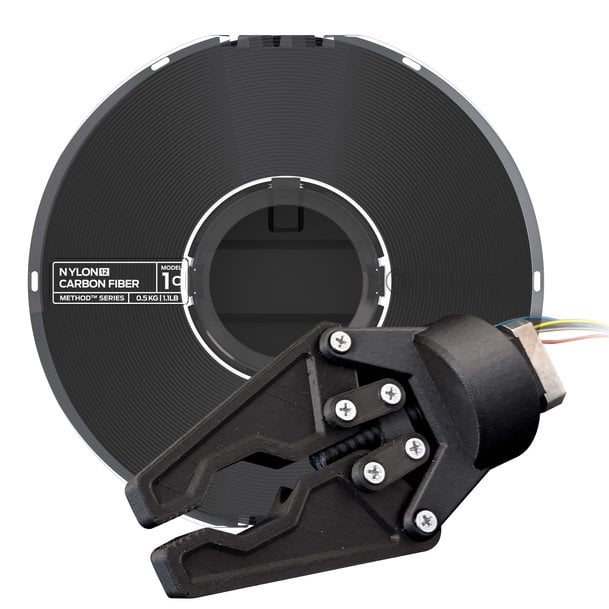www.industry-asia-pacific.com
06
'20
Written on Modified on
MakerBot Expands Composite Materials Offering with Nylon 12 Carbon Fiber
Nylon 12 Carbon Fiber can retain its mechanical properties due to low moisture absorption, enabling it to maintain consistent performance.

MakerBot, a global leader in 3D printing and subsidiary of Stratasys (Nasdaq: SSYS), today announces the expansion of its materials offering with Nylon 12 Carbon Fiber, adding another composite to the company’s growing materials portfolio.
The MakerBot® Nylon 12 Carbon Fiber material can be printed on the MakerBot METHOD and MakerBot METHOD X 3D printers using the MakerBot Composite Extruder as well as on the METHOD Carbon Fiber Edition 3D printers. The Composite Extruder features hardened metal drive gears, a metal filament switch, and an interchangeable hardened steel nozzle, which is designed to enable METHOD printers to print high-performance materials. The materials for the METHOD series are designed to enable engineers to print for a broad range of applications from prototypes to production-ready parts.
MakerBot’s Nylon 12 Carbon Fiber demonstrates strong physical and thermal properties, and can be used to print metal replacement parts in some applications. It is a resilient carbon fiber-reinforced nylon optimized for high strength and stiffness.
The MakerBot® Nylon 12 Carbon Fiber utilizes a nylon 12 base polymer, and is able to absorb less moisture than nylon 6/66. As a result, it retains more of its performance in the presence of moisture. Nylon 12 carbon fiber is designed to deliver a smooth carbon fiber 3D printing experience and achieve consistent performance in any environment. For applications that require parts to hold their form with minimal flex, such as automotive brackets or inspection gauges, nylon carbon fiber offers a tensile modulus of 6000 MPa, underscoring its high stiffness. The material is ideal for functional prototyping and lightweight tooling applications in aerospace, manufacturing, and automotive industries.
“Composite materials are ideal for a range of engineering applications. The MakerBot® Nylon 12 Carbon Fiber, in particular, offers manufacturers a cost-effective and lightweight alternative to metal 3D printing due to its high dimensional stability and excellent resistance to cracking under stress,” said Nadav Goshen, CEO, MakerBot. “By expanding the material options available for use with the METHOD 3D printers, we are providing more opportunities for users to explore new applications.”
The heated chamber in the METHOD line of 3D printers produces strong manufacturing-grade nylon carbon fiber parts, while its dry-sealed filament bays help to keep the materials dry, resulting in better print quality and reliability. For superior surface finish, users can print complex geometries using PVA or Stratasys® SR-30 soluble supports. Breakaway supports are also available for faster print results.
METHOD offers a growing portfolio of materials for a variety of applications. MakerBot’s materials for METHOD include Nylon 12 Carbon Fiber, PC-ABS, ABS, Nylon Carbon Fiber, PETG, ASA, and more. Users can also print with even more engineering-grade materials from leading third-party filament suppliers using the MakerBot LABS Experimental Extruder.
The MakerBot® Nylon 12 Carbon Fiber material is expected to begin shipping in November 2020.
www.makerbot.com

